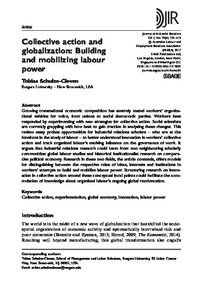Collective action and globalization: building and mobilizing labour power

Journal of Industrial Relations
2017
59
4
September
397-419
labour relations ; globalization ; trade union power ; trade union ; innovation
Labour relations
https://doi.org/10.1177/0022185617715893
English
Bibliogr.
"Growing transnational economic competition has severely tested workers' organizational vehicles for voice, from unions to social democratic parties. Workers have responded by experimenting with new strategies for collective action. Social scientists are currently grappling with how best to gain traction in analysing these changes. This review essay probes opportunities for industrial relations scholars – who are at the forefront in the study of labour – to better understand innovation in workers' collective action and track organized labour's evolving influence on the governance of work. It argues that industrial relations research could learn from two neighbouring scholarly communities: global labour studies and historical institutionalist research on comparative political economy. Research in these two fields, the article contends, offers models for distinguishing between the respective roles of ideas, interests and institutions in workers' attempts to build and mobilize labour power. Structuring research on innovation in collective action around these conceptual focal points could facilitate the accumulation of knowledge about organized labour's ongoing global reorientation."
Digital
The ETUI is co-funded by the European Union. Views and opinions expressed are however those of the author(s) only and do not necessarily reflect those of the European Union or the ETUI.